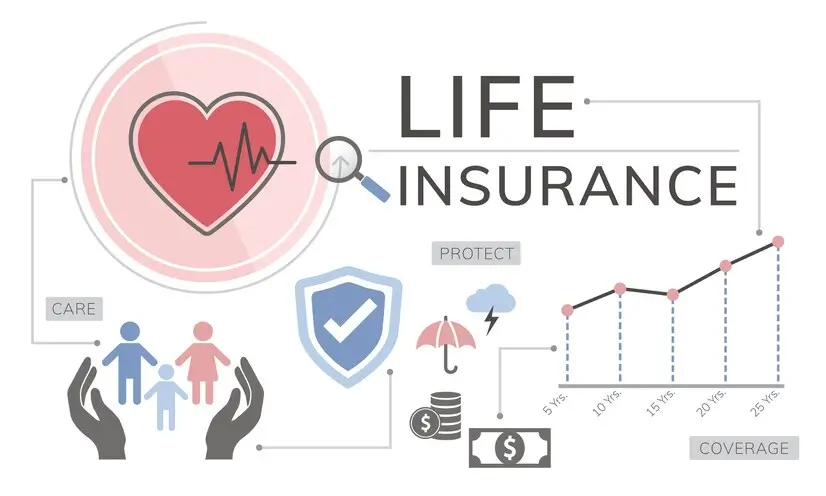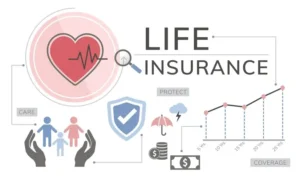Table of Contents
Life insurance plays a very significant role in financial planning. It gives you peace of mind, and in the case of any eventuality that might happen to your life, your loved ones are adequately taken care of financially. Life insurance ensures that your family remains safe from any kind of financial difficulties and lives with the same pace as they used to when you were there to provide for them.
We shall look closer at the types of life insurance, see how it works, and discuss the benefits accrued from such insurance. This will help you to understand how and upon which policy to decide in light of your needs. In the modern world, which is so unpredictable, future planning has become more relevant than ever.
Life insurance does this by providing that cushion your family falls back on when you are not there to take care of them. This pays daily expenses, outstanding loans, and education for your children-all vital things a family will struggle with once the breadwinner dies.
With this blog, one would debunk the myth of insurance by slicing the complexity into substantial, simple pieces so one can make a confident choice in picking the right policy and securing one’s family’s future. Indeed, there is nothing as important as ensuring the financial security of your family. Life insurance forms the basis of stability, offering the financial pillow that may see your loved ones through in life’s uncertainties.
This blog post will guide you through key elements of life insurance, enabling you to understand its many types, exactly how it works, and a myriad of benefits associated with it. By fully comprehending what life insurance is, you will be in a position to make informed decisions aimed at securing your family’s future and helping you be at peace.
How Life Insurance Works
Simply stated, life insurance is a contract between you and an insurance company. In return for ongoing premium payments by you, the insurer promises to pay a specifically named beneficiary a certain amount of money when you die. Life insurance provides a way for your beneficiaries to meet some or all of their financial needs including funeral expenses, mortgage payments, and other day-to-day living expenses.
Life insurance is a contract between you and your insurance company. You pay premiums on a regular basis, usually monthly or yearly, in exchange for the promise of the insurance company to pay a certain amount of money to a beneficiary you name upon your death.
Life insurance may be used to help ensure that your beneficiaries are able to meet such expenses as funeral costs, mortgage payments, and day-to-day living expenses. Life insurance is just a contract executed between the policyholder and any insurance company.
In return for the policyholder’s periodic payment of premiums, the insurer agrees to pay a certain amount of money to a named beneficiary upon the death of the policyholder. The primary purpose of life insurance is to help provide the beneficiaries with financial security, which may be used to help cover such costs as funeral expenses, mortgages, and living expenses. Life insurance offers the money that your family would have to cope with those burdens, and it’s a very important layer of financial protection and security in otherwise trying times.
Types of Life Insurance Policies: Which One Fits Your Needs?
There are several different types of life insurance policies, each designed in a way as to offer a number of distinct benefits. The two main categories of life insurance include term life insurance and permanent life insurance.
The term life insurance insures an insured for either 10, 20, or 30 years. It is considered to be general view and more affordable and less complicated. Permanent life insurance includes whole life and universal life policies, which are designed to cover a lifetime and often have an investment component along with accumulating cash value over time.
What type of policy is right for you will be determined by your financial goals, budget, and the needs of your beneficiaries. The key to choosing a life insurance policy is in your personal financial situation and whatever long-term goals you may have. Term life insurance is ideal if affordability and simplicity in coverage for a specific period-meaning, say, while the mortgage is still active or until your kids’ independence-are the main concerns.
On the other hand, unlike whole and universal life permanent life insurance, it covers protection for the entire life of the policyholder, but it also bears the advantage of cash value accumulation. Cash value in itself becomes quite a valuable financial resource able to provide two ways out: taking loans or withdrawals.
Finally, your proper policy would come up in accordance with your budget, the needs of the beneficiaries, and the whole strategy. By carefully weighing these considerations, you are better placed to choose a life insurance policy that would provide an adequate balance between coverage and possible financial growth.
How Life Insurance Works: From Premiums to Payouts
Insurance policies on life, by definition, are normally required to be paid regularly by the insured for coverage to remain active. These premiums may be payable monthly, quarterly, or annually, depending upon the terms within the policy.
For example, on the death of the policyholder, an insurance firm processes a claim in exchange for the death benefit and pays this amount out to beneficiaries named. This amount received may be used for paying funeral expenses, to pay off debts, or even for investment towards the future.
One purchases life insurance policies wherein the payers of premiums have to continuously pay premiums in order to keep their life insurance cover going. These premiums can be arranged according to how the individual’s finances can cope with monthly, quarterly, or annual payments.
The amount you pay depends on factors such as your age, health, and what type of policy you buy. Your beneficiaries file a claim with the insurance company when you die, usually attaching a death certificate. Once the insurer processes-a usually speedy-process-your death benefit is paid out to the beneficiaries.
It can be used for everything from burial expenses and unpaid debts to future financial requirements, such as educational or retirement needs: just about anything you need to guarantee that those dependent on you are well taken care of financially during an otherwise particularly difficult time Life insurance.
Life Insurance Benefits: More Than a Safety Net
Apart from the main benefit-life insurance provides a financial security shield for your family in your absence-it also brings in estate planning: generally, it helps in paying the estate taxes and provides an orderly distribution of the estate.
Some policies of life insurance build up cash over a period of time which one can borrow or withdraw for any particular need, like educating a child or supplementing retirement income.
Life insurance provides a host of other benefits than just being a backup plan for one’s family. It can be an estate planning tool to help minimize estate taxes and facilitate smooth transfers of assets. Some types of life insurance may even build cash value over time that one can borrow against or withdraw to meet various financial needs, such as financing a child’s education or supplementing retirement income.
Moreover, life insurance can facilitate business continuity by financing either buy-sell agreements or key person insurance to maintain stability within the business should you be unable to continue. By incorporating life insurance into your financial plan, you will be able to tap into its various benefits toward a much more stable and secure future for your family and business Life insurance.
How to Choose the Right Policy: Tips and Considerations
Your life insurance decision incorporates numerous elements. First, you must consider your financial objectives, the needs of your beneficiaries, and your budget to determine how much coverage you need and what type of policy to choose. You also want to research insurance companies, compare quotes, and study the fine print for any policy that catches your interest. Certainly, consultation with a financial advisor will be extremely valuable, helping you make a comprehensive decision.
It is very important to choose an appropriate life insurance policy. First of all, a person needs to analyze his financial goals, the needs of beneficiaries, and the budget of the insurer. All these three factors will help the individual estimate a proper sum of coverage and the type of policy.
It is also worth noting that one should conduct a study of several insurance companies, compare the quotes, and check policy conditions very carefully. Of course, this process can be more effective if an individual consults with a financial planner or agent. The right policy of life insurance has to be selected, keeping in view a host of factors.
First, consider your financial goals, the needs of the beneficiaries, and your budget. These are factors that will drive you toward how much cover and the type of policy you should get Life insurance. Also, be sure to research insurance companies and compare quotes, in addition to carefully reading over policy details. This is where a financial advisor can give very valuable insights and help one make an educated decision .
Apart from that, consider the flexibility of the policy, such as whether the insurance coverage can be modified when your financial situation changes, and the insurer’s customer service and claim settlement reputation Life insurance. These would enable you to choose a life insurance policy that would satisfy both existing needs and emerging circumstances for long-term financial security for your loved ones.
Common Myths and Misconceptions About Life Insurance
In fact, there are many myths and mistaken conceptions about life insurance that keep people away from buying a policy. Some people mistakenly think that life insurance is only required when they are older or have dependants.
Actually, life insurance can be useful for all ages and stages of life. It is actually a fallacy to regard life insurance as being too expensive since it can come with different, more affordable options depending on the budget.
Another common myth is that the amount of life insurance through your employer is sufficient. While this is a great benefit, often the amount offered is simply not enough to take proper care of your family’s financial needs.
Furthermore, relying only on life insurance provided by your employer is precarious, as most coverage in fact expires upon leaving the job Life insurance. Another myth: life insurance proceeds are subject to income taxation.
In fact, under most circumstances, death benefits paid to beneficiaries are income tax-free. Awareness of such myths and misconceptions will give you better clarity for decision-making on behalf of your needs regarding life insurance and, therefore, the comprehensive protection of your loved ones.
Planning for the Future: Getting Started with Life Insurance
Getting started with life insurance means first determining just how much protection you will need and comparing it to your current financial state. Account for every expense, debt, and financial obligation that would fall upon your beneficiaries Life insurance.
Research the many different types of policies and insurers, and it may be advisable to seek the advice of a financial adviser. Then, when you have identified one that suits your needs, fill in the application forms and attend any medicals required by the insurer to confirm the policy of insurance Life insurance.
Planning for the future with life insurance commences with assessing your financial situation and the needs of your beneficiaries. First, calculate how much money it takes to support you currently, how much will be required in the future, including debts, mortgage payments, and educational costs. This would give you the amount of cover needed to keep your loved ones secure financially.
Secondly, different types of policies are in existence for life insurance; for example, term and permanent life insurance policies. Take a look at these, and see which one might fit into your financial goals and budget. Consult a financial adviser to guide you through everything about life insurance.
Then, choose a policy and complete the application from that selected insurance company, which may be complete with taking a medical test, in that way finalizing your coverage. These steps will lead you to confident acquiring of life insurance policy that will comfort and offer some fiscal protective cover to your family in case of eventualities.
Conclusion
Life insurance is an indispensable part of any holistic financial plan, wherein peace of mind and protection to oneself and one’s loved ones are guaranteed. You will be in a better position to make a decision with a view to securing your family’s future by understanding the different types of policies, how they work, and their respective benefits.
Take the time to evaluate your needs and then study the options available, even seeking the advice of a professional when selecting the best policy that fits your situation. Life insurance is an essential component in the broad financial planning of a person since it offers protection needed for one’s peace of mind and that of his loved ones.
Accordingly, knowing various policy types, the way they work, and what each has to offer will create an informed decision whereby your family is guaranteed financial security. Take some time to evaluate your needs and consider options, and call in professional advice on the best-suited policy matching your unique situation. You can confidently make sure your family will be set when life throws its twists and turns by taking advantage of the right life insurance policy.
FAQ
Q: What’s the huge difference between term life and whole life?
A: With a term, one can get insurance just for a fixed period, but in the case of whole life insurance, one gets it throughout his life and he can be endowed with a cash value.
Q: How much life insurance do I need?
A: Life insurance needed is related to your financial goals, your debt level, and needs of beneficiaries, which should be determined with a financial advisor.
Q: But is it possible to change my life insurance policy later?
A: You can make adjustments, such as increasing or decreasing the coverage amount, but you should check your policy terms and conditions.









